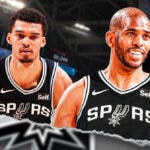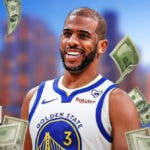The Golden State Warriors had control of the game for most of the fourth quarter in Game 1 of the Western Conference semifinals against the Houston Rockets. However, when Chris Paul stole the ball from Kevin Durant with under 20 seconds to play and Houston down three, the Rockets had a chance.
James Harden's game-tying 3-pointer was off the mark, but Paul secured the rebound and looked to kick it back out to Harden who was still in a crumpled heap after getting caught up with Draymond Green on the way down from his jumper. Paul then attempted to get the ball to Eric Gordon, making contact with Klay Thompson in the process.
In a wild scramble, Gordon touched the ball out of bounds, handing the Warriors possession of the ball. Paul — furious with what he thought was a bad no-call — bumped into the sideline official, resulting in his second technical foul and subsequent ejection.
However, the league office elected not to suspend Paul for Game 2, which apparently has the referees union, officials and NBA executives around the league baffled, per Adrian Wojnarowski of ESPN.
“Privately, the referees union, officials themselves and even a lot of rival teams wonder what kind of precedent that sets, that Chris Paul did not get suspended for, in the words of the league, ‘Recklessly making contact with a game official.' Several team executives around the NBA privately wondered to me, ‘Would there have been a different outcome if Draymond Green had bumped an official in a game?'”
And, linguistically, it is curious that the league would state that Paul “recklessly” made contact with an official and then fail to suspend him. Paul was fined $35,000, but no further punishments were given.
Paul's presence hardly made any difference in Game 2 of the series. He scored 18 points, but shot just 2-of-7 from three-point range as the Warriors defeated the Rockets again to take a 2-0 series lead.
However, league personnel (as well as the officials) are concerned that the NBA's relative failure to deliver a punishment with legitimate consequences might allow players to confront officials more often in such an unsportsmanlike manner.




